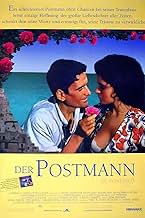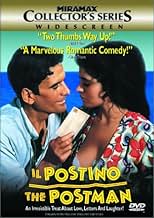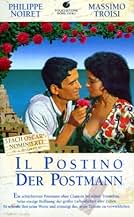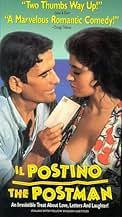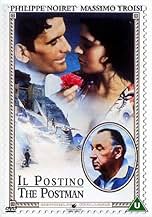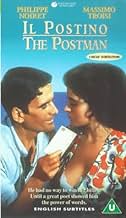IMDb RATING
7.8/10
40K
YOUR RATING
A simple Italian postman learns to love poetry while delivering mail to a famous poet, and then uses this to woo local beauty Beatrice.A simple Italian postman learns to love poetry while delivering mail to a famous poet, and then uses this to woo local beauty Beatrice.A simple Italian postman learns to love poetry while delivering mail to a famous poet, and then uses this to woo local beauty Beatrice.
- Won 1 Oscar
- 31 wins & 20 nominations total
Calogero Azzaretto
- Bookseller
- (uncredited)
Simona Caparrini
- Elsa Morante
- (uncredited)
Angelo Casadei
- Cinema Spectator
- (uncredited)
Chuck Riley
- Narrator of Theatrical Trailer
- (voice)
- (uncredited)
Featured reviews
Although "Il Postino" simply means "The Postman", and although the film was at one time screened as "The Postman" in Britain, it is now generally known in English by its Italian title to avoid confusion with Kevin Costner's post-apocalyptic epic from three years later. It is loosely based upon the novel "Ardiente paciencia" by the Chilean writer Antonio Skármeta, although it transfers the action from Chile to Italy. It takes as its starting-point the fact that in the early 1950s the famous Chilean poet Pablo Neruda, in exile from his homeland for political reasons, spent some time on the island of Capri. The film, however, is not set on Capri but on an unnamed Italian island.
A young fisherman named Mario Ruoppolo applies for a job as the island's postman. As he owns a bicycle and is one of the very few islanders who can read and write he is accepted and is told that he will only have one customer, Neruda himself, as because of the low levels of literacy on the island nobody else ever receives any mail. (Were standards of education really so low in fifties Italy?)
Although Mario has never previously heard of Neruda, and certainly has never read any of his poems, a friendship gradually grows up between the two men. Although Mario has had little formal education he is clearly an intelligent and sensitive man, and Neruda reads him some of his poetry (in Italian translation), teaching him about literary concepts such as metaphors. With Neruda's help Mario woos the beautiful Beatrice, a village girl with whom he has fallen in love, stealing some of the older man's love poems and passing them off as his own in order to win her affections.
My one criticism of the film would be that it is too sentimental about Communism, but that is perhaps only to be expected of a film from Italy, a country which at one time had the largest Communist Party in Western Europe. (In the seventies they used to win around a third of the popular vote, at a time when the British Communist Party generally consisted of three old men and a dog). Pablo Neruda is here portrayed as a kindly, idealistic gentleman, but in reality, during the forties and early fifties, he was a Communist hardliner who enthusiastically defended Stalin's dictatorship in the Soviet Union. After Khrushchev's 1956 "secret speech" he was to criticise the Stalinist cult of personality but this was due less to a change of heart than to a desire to align himself with the new official Soviet party line. He was also, at the time of his Italian exile, around twenty years younger than the character portrayed here by Philippe Noiret.
Its politics aside, however, "Il Postino" is in many ways an excellent film. There is some attractive photography of the Italian coastal scenery and a great musical score by Luis Enríquez Bacalov. What really makes the film stand out, however, are the two great performances from Noiret and from Massimo Troisi, who tragically died of a heart attack soon afterwards, as Mario. There is also a good performance from the lovely Maria Grazia Cucinotta as Beatrice. Troisi received a posthumous Oscar nomination for "Best Actor", but lost out to Nicholas Cage in "Leaving Las Vegas"; as I have never seen that film I am unable to comment on the justice of that decision. I felt, however, that it was unfortunate that there was no nomination for Noiret either as "Best Actor" or "Best Supporting Actor". Indeed, this is one of those films which make me feel that it should be possible to nominate two actors for a joint award, as Noiret and Troisi combine together so well that their joint contribution seems greater than the sum of its two parts. This is the story of a touching relationship between two men of different generations, of different nationalities, of different levels of education and of different outlooks on life who are nevertheless united in friendship. 8/10
A young fisherman named Mario Ruoppolo applies for a job as the island's postman. As he owns a bicycle and is one of the very few islanders who can read and write he is accepted and is told that he will only have one customer, Neruda himself, as because of the low levels of literacy on the island nobody else ever receives any mail. (Were standards of education really so low in fifties Italy?)
Although Mario has never previously heard of Neruda, and certainly has never read any of his poems, a friendship gradually grows up between the two men. Although Mario has had little formal education he is clearly an intelligent and sensitive man, and Neruda reads him some of his poetry (in Italian translation), teaching him about literary concepts such as metaphors. With Neruda's help Mario woos the beautiful Beatrice, a village girl with whom he has fallen in love, stealing some of the older man's love poems and passing them off as his own in order to win her affections.
My one criticism of the film would be that it is too sentimental about Communism, but that is perhaps only to be expected of a film from Italy, a country which at one time had the largest Communist Party in Western Europe. (In the seventies they used to win around a third of the popular vote, at a time when the British Communist Party generally consisted of three old men and a dog). Pablo Neruda is here portrayed as a kindly, idealistic gentleman, but in reality, during the forties and early fifties, he was a Communist hardliner who enthusiastically defended Stalin's dictatorship in the Soviet Union. After Khrushchev's 1956 "secret speech" he was to criticise the Stalinist cult of personality but this was due less to a change of heart than to a desire to align himself with the new official Soviet party line. He was also, at the time of his Italian exile, around twenty years younger than the character portrayed here by Philippe Noiret.
Its politics aside, however, "Il Postino" is in many ways an excellent film. There is some attractive photography of the Italian coastal scenery and a great musical score by Luis Enríquez Bacalov. What really makes the film stand out, however, are the two great performances from Noiret and from Massimo Troisi, who tragically died of a heart attack soon afterwards, as Mario. There is also a good performance from the lovely Maria Grazia Cucinotta as Beatrice. Troisi received a posthumous Oscar nomination for "Best Actor", but lost out to Nicholas Cage in "Leaving Las Vegas"; as I have never seen that film I am unable to comment on the justice of that decision. I felt, however, that it was unfortunate that there was no nomination for Noiret either as "Best Actor" or "Best Supporting Actor". Indeed, this is one of those films which make me feel that it should be possible to nominate two actors for a joint award, as Noiret and Troisi combine together so well that their joint contribution seems greater than the sum of its two parts. This is the story of a touching relationship between two men of different generations, of different nationalities, of different levels of education and of different outlooks on life who are nevertheless united in friendship. 8/10
A beautiful movie that does an excellent job bringing to life Neruda's love poems and how they touch the life of a simpleton postman. It inspires in one, a spiritual and sensual love for poetry. The music is intricately woven into the fabric of the story, and is surely a high point in the movie. Great cinematography, matched frame by frame with the splendid acting, especially that of Massimo Troisi and Philippe Noiret. Watch this movie if you are disillusioned with the notion of romance, and need some succour.
The movie once again reinforces my admiration for the Italian film-makers. What amazes me is their simplicity in relating a tale, and how subtly pathos is displayed in their movies. This is also evidenced in "Life is Beautiful" and "The Bicycle Thief".
The movie once again reinforces my admiration for the Italian film-makers. What amazes me is their simplicity in relating a tale, and how subtly pathos is displayed in their movies. This is also evidenced in "Life is Beautiful" and "The Bicycle Thief".
Lyrical, moving and beautifully photographed gentle comedy in which an exiled Chilean poet inspires his Italian postman to woo and marry a local girl. Massimo Troisi gives a wonderfully contained performance as the postman who learns to see the beauty in poetry and his home on an Italian island. Philippe Noiret plays the poet Pablo Neruda with the usual assuredness. It is difficult not to be moved by the simple beauty of the film.
10jotix100
Michael Radford, an English director, ought to be given credit for bringing this beautiful story to the screen. It speaks volumes that Mr. Radford achieves a triumph with a film that for all practical purposes should have been directed by an Italian. This is a timeless story of friendship, poetry and love set in a desolated island that was to be Pablo Neruda's home in exile.
The story is a simple one. Mario Ruoppolo, a poor man without a job, suddenly applies for a vacant position that will pay almost nothing, but by becoming a letter carrier he gets the chance of meeting a man that will make a deep impression on him and who will change his life completely.
Mario, the postman, is almost illiterate. He can read and write, with only the basic knowledge he probably picked up in the island school. He is allergic to fishing, and can't make a living like his father, and probably most of his ancestors before him. It's the time after WWII in which a poor Italy is still recovering from the devastation and defeat.
Pablo Neruda, the Chilean poet, finds a rustic home in the island. He is the most famous person ever to set foot in there. Mario is in charge for bringing Pablo his packages and mail. An easy friendship develops between them. Like everyone else in the island, Mario is impressed by the foreigner. In trying to imitate his poet friend, Mario awakens to all the beauty around him and discovers love with the gorgeous local girl, Beatrice Russo.
The film's mood changes right after Pablo Neruda and his wife receive assurances they can go back to their native land. This leaves Mario in a sad state, but now that he is married, he has other responsibilities to live for. Neruda had awakened in Mario a desire to speak for himself and to seek justice.
This is a film totally dominated by the late Italian actor Massimo Troisi, who as Mario, completely captures us by just being a simple soul with no malice. Mr. Troisi is splendid in his take of this poor man who discovers beauty and poetry late in his life. Philippe Noiret, is Pablo Neruda. Mr. Noiret makes a great contribution as the man who sees beauty everywhere and translates it into poetry. Maria Grazia Cucinotta is the beautiful Beatrice, the woman who loves Mario. Renato Scarpa and Linda Moretti, play minor roles with success.
"Il Postino" is helped by the magnificent cinematography of Franco di Giacomo who captures the island in all its splendor. The music score is another asset. Luis Bacalov's tuneful background music adds another layer in this film rich texture.
This film is an excellent way to be introduced to Pablo Neruda's poetry, even if it's only for the curiosity the film will give even a casual viewer. Thanks to Michael Radford for a poetic view of this lonely place where two people meet and are changed forever.
The story is a simple one. Mario Ruoppolo, a poor man without a job, suddenly applies for a vacant position that will pay almost nothing, but by becoming a letter carrier he gets the chance of meeting a man that will make a deep impression on him and who will change his life completely.
Mario, the postman, is almost illiterate. He can read and write, with only the basic knowledge he probably picked up in the island school. He is allergic to fishing, and can't make a living like his father, and probably most of his ancestors before him. It's the time after WWII in which a poor Italy is still recovering from the devastation and defeat.
Pablo Neruda, the Chilean poet, finds a rustic home in the island. He is the most famous person ever to set foot in there. Mario is in charge for bringing Pablo his packages and mail. An easy friendship develops between them. Like everyone else in the island, Mario is impressed by the foreigner. In trying to imitate his poet friend, Mario awakens to all the beauty around him and discovers love with the gorgeous local girl, Beatrice Russo.
The film's mood changes right after Pablo Neruda and his wife receive assurances they can go back to their native land. This leaves Mario in a sad state, but now that he is married, he has other responsibilities to live for. Neruda had awakened in Mario a desire to speak for himself and to seek justice.
This is a film totally dominated by the late Italian actor Massimo Troisi, who as Mario, completely captures us by just being a simple soul with no malice. Mr. Troisi is splendid in his take of this poor man who discovers beauty and poetry late in his life. Philippe Noiret, is Pablo Neruda. Mr. Noiret makes a great contribution as the man who sees beauty everywhere and translates it into poetry. Maria Grazia Cucinotta is the beautiful Beatrice, the woman who loves Mario. Renato Scarpa and Linda Moretti, play minor roles with success.
"Il Postino" is helped by the magnificent cinematography of Franco di Giacomo who captures the island in all its splendor. The music score is another asset. Luis Bacalov's tuneful background music adds another layer in this film rich texture.
This film is an excellent way to be introduced to Pablo Neruda's poetry, even if it's only for the curiosity the film will give even a casual viewer. Thanks to Michael Radford for a poetic view of this lonely place where two people meet and are changed forever.
his performance is essence of this adorable film. his character is so careful created that its fragility, humor, innocence, light of details are magnificent. he don't play a role but he is "il postino" . and this fact transforms entire scene. the story of Neruda exile is only arena for emotions of a small man on an Italian isle. the beautiful Beatrice is brick for his delicate happiness. Neruda himself is not exactly a mentor but a gardener. and the music, the extraordinary music, it is the soul of entire poetry. because a poetry is this movie who has as roots poems. very delicate, nice, nostalgic, melancholic, subtle, intelligent, precise, it is wonderful homage to a way to discover life as fundamental miracle. to feel the nuances of love, friendship, to be humble, modest and daring in same time, to feel gratitude as form of respiration. beautiful and impressive. touching. and unique. story of a postman. legacy of Massimo Troisi.
Did you know
- TriviaWriter/co-director/star Massimo Troisi postponed heart surgery so he could complete the film. The day after filming was complete, he suffered a fatal heart attack.
- Quotes
Mario Ruoppolo: Poetry doesn't belong to those who write it; it belongs to those who need it.
- Alternate versionsThe Italian version of the film includes an additional title credit for Massimo Troisi, listed as co-director of the movie together with Michael Radford.
- ConnectionsEdited into Laggiù qualcuno mi ama (2023)
- SoundtracksMadreselva
Written by Francisco Canaro (as F. Canaro) and Luis César Amadori (as L.C. Amadori)
Performed by Carlos Gardel
Courtesy of E. Musical Pirovano
- How long is The Postman?Powered by Alexa
- Is this film based on real events?
- What does the sign say above the café where Beatrice works?
Details
- Release date
- Countries of origin
- Official sites
- Languages
- Also known as
- The Postman
- Filming locations
- Pollara, Salina Island, Aeolian Islands, Messina, Sicily, Italy(rural and beach scenes)
- Production companies
- See more company credits at IMDbPro
Box office
- Budget
- $3,000,000 (estimated)
- Gross US & Canada
- $21,848,932
- Opening weekend US & Canada
- $95,310
- Jun 18, 1995
- Gross worldwide
- $21,902,150
- Runtime1 hour 48 minutes
- Color
- Sound mix
- Aspect ratio
- 1.66 : 1
Contribute to this page
Suggest an edit or add missing content





